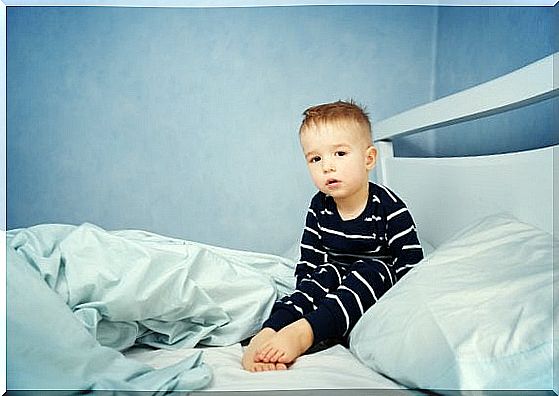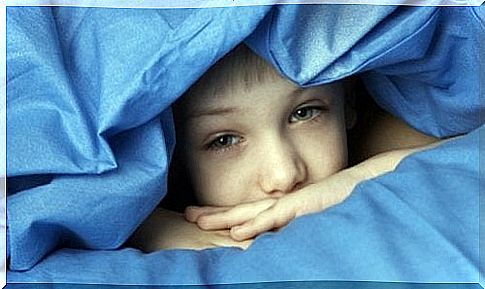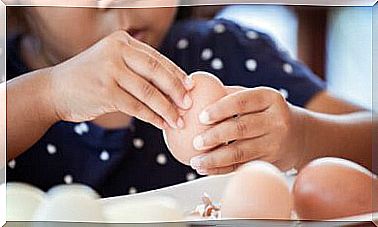The Most Common Sleep Disorders In Children

Parents are concerned about any discomfort their children show and about providing them with good food, recreation, medical care, and care during an illness. This includes giving children good rest, preventing them from having trouble sleeping. Therefore, knowing the most common sleep disorders in children is important.
Sleep is very significant for children because it leads to healthy growth and development. Therefore, it is important to prevent problems from occurring in this important aspect of their lives. So, you must learn to detect what these problems are and what their causes are.
How do you know if there is a sleep problem in children?
The most common sleep disorders in children are problems that are directly or indirectly related to rest. The most frequent are:
- Insomnia: The child cannot sleep.
- Narcolepsy: Makes the child sleepy during the day or stay sleepy for long periods of time.
- Strange behaviors during sleep: Sleepwalking, sleep apnea, REM sleep disorders, nightmares, night terrors, among others.
- Bad sleep habits: Bad biological phases and acquired bad behaviors.
Medical Causes of Sleep Disorders in Children
Another of the most common sleep disorders in children is associated with a medical condition. The ones that appear most frequently are:
- Allergies: They interrupt the child’s normal sleep rhythm and cause them to sleep fitfully.
- Pains: A very strong discomfort in the child will not allow him to have complete rest.
- Enuresis: It is urinary incontinence during sleep. It is recommended to consult a doctor if, at the age of five, the child still does not have control over the bladder sphincter. This can be associated with a disease such as diabetes, for example.
- Diseases: Headaches, asthma, diabetes mellitus, gastroesophageal reflux, epileptic seizures or long-term illnesses, among other possibilities, disturb the child’s sleep.
- Taking medications: Depending on their chemical components, they can alter the child’s sleep.

How many hours are needed for children’s rest?
The amount of sleep needed depends on the child’s age. Newborns need more time: about 16 hours a day. Also, they wake up every 3 hours to feed and change their diapers.
Then, at three months, they start sleeping through the night, but they still need 15 hours of sleep. From six months to the first year, it is between 12 and 16 hours with naps in between.
Later, between the first and second year of life, children need to sleep from 11 to 14 hours, also with naps. Meanwhile, from three to five years old, they sleep between 10 and 13 hours, also with naps.
Finally, from the age of 6 and into early adolescence, the necessary rest is between 8 and 12 hours.
How to prevent the most common sleep disorders in children?
It is possible to take actions that help prevent the most common sleep disorders in children. They are applicable from breastfeeding to pre-adolescence. Some of them are:
- Do not get children used to relying on something to sleep: For example, a bottle, a pacifier or a breast, because this would produce a bad habit in the child who will not be able to fall asleep without this element.
- Create a pleasant bedtime environment: At night, parents should provide confidence that the child will be calm at bedtime.
- Get the child used to sleeping alone: By sleeping with the parents, the child can be woken up. Therefore, it is a custom that must be eliminated early on.

- Make sure the child has a daily bedtime routine: Examples of this are having a light snack, brushing teeth, putting on pajamas, reading a story and turning on a lamp on the bedside table.
- Set a fixed time to sleep.
- Try to get the child to fall asleep alone.
- Avoid hyperactive activities before bed : This includes sports, video games or watching television.
How to act if the child has a sleep disorder?
Some recommended measures to avoid this problem are: not taking very long naps, giving foods that help you sleep and, at the same time, avoiding consuming those that interfere – such as chocolate or soda with caffeine – transmit safety and avoid excess liquids so that the child does not get up during the night.
It is vital that the child sleeps the necessary hours according to the different stages of development, in a calm environment and with the best environmental conditions. That way, she will get used to acquiring good habits that will help her fall asleep. Certainly, it is necessary to consult a pediatrician if we believe that the cause is medical.









